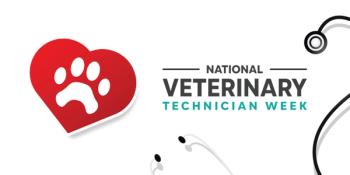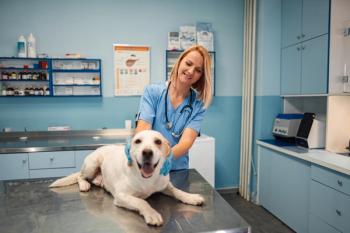
Let's talk about it: Getting the best medical history from your clients (Proceedings)
We do it every day with practically every patient and client.
We do it every day with practically every patient and client. It's the foundation for a thorough medical examination. What is it? Of course we're talking about obtaining a medical history. But that's – BORING! Right? Not so fast. Obtaining at thorough medical history in a structured and succinct fashion is as much art as science. The ultimate goal is to get the most amount of pertinent information in the least amount of time. By obtaining an accurate medical history, we help the doctors arrive at a diagnosis much faster and benefit the client and patient.
Where Do We Start?
Every appointment involves a basic transaction: the client comes to us to give them a solution for a problem or provide some benefit for their pet. In order for us to give the client and patient what they need, we must communicate with them. Sounds really basic – and it is. But ask yourself a simple question: How many times a day does a doctor ask you something about a case that you didn't know? It was some information that you should've asked the client while getting the medical history. For example, a dog presents with diarrhea and you forgot to ask them what they normally feed the pet. Or an itching pet and you forgot to find out what flea and tick preventive they used and when it was last applied.
Let's face it, these things occur every day. While we'll never be perfect, we can reduce these omissions to a minimum. This will save us valuable time, allow our doctors to get to the work of diagnosing and treating sooner and demonstrate to our clients the attentiveness and thoroughness of our team.
So how do we improve our ability to obtain an accurate medical history in a timely manner? The first step is to determine what information is vital to acquire. I recommend that you have the doctors write down a list of the information they feel is most important to them. Start with the basics:
Pet and Client's Name – sounds silly, but you need to verify this information. People get married or divorced or your doctors forget.
Date – for the record and for future reference
Chief Complaint and Duration – critical – make sure to identify the leg the pet is limping on, how long the cat has been urinating outside of the litter box, when the last dose of medication as administered, etc.
Weight and Temperature – basic physical information that is key to a thorough physical examination
Diet – Main food fed, brand and amount and treats, including table or people foods. Also, be sure to ask about vitamins, supplements, etc. that the client will often forget to mention.
Medications – Any and all medications administered, including heartworm and flea preventives.
Previous Medical Conditions – Has the pet had anything like this before? If so, what was the diagnosis, treatment and how did it resolve?
Vaccination and Test Status – Are they current on needed vaccines, heartworm antigen tests, Feline Leukemia Virus (FeLV) and Feline Immunodeficiency Virus (FIV) tests, senior blood and urine tests?
Exposure to Other Pets, Travel, or Stressful Events – Ask about other household pets. Remember, most dog owners have about two dogs. Is the other pet healthy? Have they traveled recently? Has there been any stressful event such as moving, visitors, a new pet, fireworks, etc.? Has the pet been recently bathed or groomed?
Beyond the Basics
Once you have identified the basics you want to address during the medical history, it's time to look at HOW to obtain a medical history. For that, let's review some basic communication tips.
Use Their Name – From start to finish, your team should use names and refer to each pet as personally as possible. We sometimes overlook this deceptively simple technique that keeps it intimate and caring. Unfortunately all too often we go through our days and few people outside of our friends and family call us by name. Show you care by referring to the owner respectfully ("Mrs. Jones") and show you know or care for their pet ("and her sweet little girl Sandy").
Make Eye Contact – Make sure to make good and extended eye contact with the client, especially during when they are answering your questions. Be careful not to bury your gaze in your medical record as you write down their response. Direct eye contact shows you're interested in what they're saying and really listening.
Show Compassion – Be sure to arm yourself with a warm and caring smile. If you're making good eye contact, you'll find it's much easier to smile and convey warmth. Make a compassionate remark at the opening of the appointment such as, "Poor Mr. Scooter, I
Be Seated – A stool in the exam room is one of my favorite accessories. Avoid leaning on the exam table. A stooped or slouched posture signals disinterest and inattentiveness, no matter how attentive and interested and caring you may be. Cross your ankles when seated. Place your medical record and clipboard or tablet PC on your lap and refer to it as sparingly as possible. Place your hands in your lap unless using them to illustrate a point.
Stay Focused – It's easy to become distracted and pursue a tangent that isn't productive. Be cautious about getting off topic. Keep referring back to the purpose of the visit. Be nice, but remember, you have a job to do and a schedule to keep. That extra five minutes here and there could add up to you leaving your job thirty minutes later in the evening. Stay aware of the time you're spending and how you're spending it.
Structure
Once you know what you want and you practice techniques that will help you get it, it's time to discuss the method of procuring the medical history. Within our hospital teams we have team members with varying experience levels, training and interests. To help ensure that any and every team member can get the type of medical history we desire, we need to structure the experience as much as possible. To accomplish this, a simple tool is the medical questionnaire.
Questionnaires often have a bad reputation in the medical fields because we usually think of them in terms of the client or patient answering a series of questions. They are extremely unspecific and general. In fact, most aren't even looked at by the hospital staff. This is NOT what I am referring to. I am referring to a new generation of medical questionnaires administered by the hospital staff. These questionnaires are specific to the reason for the visit.
For example, for all annual adult dog examinations, we have a physical examination report that has our basic medical questionnaire, a physical examination report detailing each major body system and our findings and a section that includes items that an adult dog should have and whether or not the owner has them (to purchase copies of these forms to use in your hospital, visit
The basic questions we ask include:
Pet's Name ____________________ Date _____________
Age ________yrs. Weight ________lbs.
1. What heartworm and flea/tick preventive are you using?
■None ■Yes _______________________
Last Administered ____________
Have you seen any fleas or ticks on your dog? ■No ■Yes
2. What brand of food do you feed your dog? How much do you feed? ________________________
3. Do you provide any dental care for your dog? ■No ■Yes _________________________________
4. Do you have other pets? If yes, are they currently vaccinated and on heartworm and flea preventive? ■None ■Yes ____________________________________________________
5. Does your dog go outside: ■Daily for Bathroom/Walks
■50:50 Indoor/Outdoor ■Outdoor Dog
6. Does your dog: ■Board ■Groom ■Dog Parks
■Obedience/Training Classes ■Contact Neighborhood Dogs
7. Have you noticed any lumps or bumps on your dog? ■None ■Yes _________________________
8. Have you noticed any of the following: ■Coughing or Labored Breathing ■Limping ■Lethargy ■Increased Thirst ■Increased Urination ■Diarrhea ■Vomiting ■Other ________________
9. Does your dog have any behaviors you wish you could change?
■None ■Yes ________________
10. Are there any health issues you'd like to discuss with the doctor?
■None ■Yes _______________
We have similar forms for Adult Cats, Senior Dogs, senior Cats, Puppies and Kittens. By creating specific questionnaires for each of these categories, we are able to address the unique needs of a senior cat as opposed to a puppy.
The Modern Medical Questionnaire
In addition, we have medical questionnaires for each of the most common medical complaints we see. Some of the questionnaires we use include:
Limping
Vomiting and/or Diarrhea
Coughing
Red, Squinty Eye(s)
Abnormal Urination
Sneezing and/or Ocular Discharge
Itching
Each of these questionnaires has specific questions applicable to the medical condition. For example, an itching questionnaire asks the client about flea and tick preventive use, hair loss, bathing and grooming, diet and treats and so on. Our Vomiting/Diarrhea questionnaire asks the client how often and how much diarrhea in addition to diet, medications, exposure to other pets, travel, stress and so forth.
By standardizing the information we want and need, this ensure consistency within our team and enables us to deliver high standards of care to each and every patient without wasting time asking questions over and over again. Further, by providing structured exam questions any team member, regardless or experience or expertise, can gather the essential information your team needs to diagnose disease. Even better, this eliminates the dreaded "I just told all of this to the other person" feeling we get when the doctor or other healthcare provider asks us the same questions that we just answered ten minutes ago.
Determine what information you need to do your job, develop a structured way to do it consistently and create the tools that enable you to complete your vision. The Medical History: one of the most important things we do with every client but one that we rarely study and analyze. Take the time to train your team to better obtain the medical history and your clients, patients and team will reap the rewards. For additional information, visit
Newsletter
From exam room tips to practice management insights, get trusted veterinary news delivered straight to your inbox—subscribe to dvm360.






